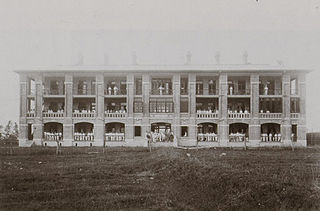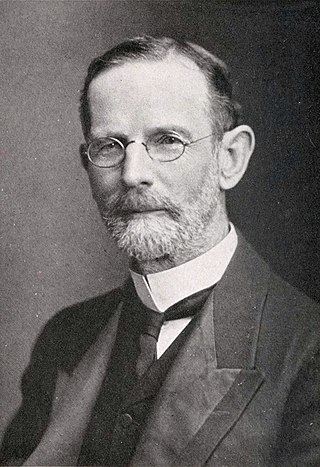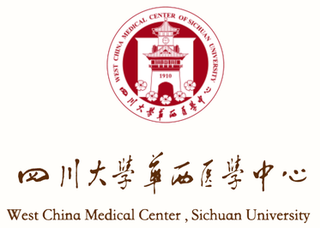Related Research Articles

Sun Yat-sen University is a public research university in Guangzhou, Guangdong, China. It is affiliated with the Ministry of Education, and co-funded by the Ministry of Education, SASTIND, and Guangdong Provincial Government. The university is part of Project 211, Project 985, and the Double First-Class Construction.

Peking Union Medical College, founded in 1906, is a national public medical college located in Dongcheng, Beijing, China. It is affiliated with the National Health Commission. The college is part of the Double First-Class Construction. The school operates the Peking Union Medical College Hospital and hosts a joint 8-year clinical medicine science program with Tsinghua University.

Lingnan University was a private university from 1888 to 1952 in Guangzhou, Guangdong, China. It was established by a group of American missionaries in 1888 as the Canton Christian College (格致書院).

Walter Russell Lambuth was a Chinese-born American Christian bishop who worked as a missionary establishing schools and hospitals in China, Korea and Japan in the 1880s.

In the early 19th century, Western colonial expansion occurred at the same time as an evangelical revival – the Second Great Awakening – throughout the English-speaking world, leading to more overseas missionary activity. The nineteenth century became known as the Great Century of modern religious missions.

Cheeloo University was a university in China, established by Hunter Corbett American Presbyterian, and other English Baptist, Anglican, and Canadian Presbyterian mission agencies in early 1900 in China.
Medical missions in China by Catholic and Protestant physicians and surgeons of the 19th and early 20th centuries laid many foundations for modern medicine in China. Western medical missionaries established the first modern clinics and hospitals, provided the first training for nurses, and opened the first medical schools in China. Work was also done in opposition to the abuse of opium. Medical treatment and care came to many Chinese who were addicted, and eventually public and official opinion was influenced in favor of bringing an end to the destructive trade. By 1901, China was the most popular destination for medical missionaries. The 150 foreign physicians operated 128 hospitals and 245 dispensaries, treating 1.7 million patients. In 1894, male medical missionaries comprised 14 percent of all missionaries; women doctors were four percent. Modern medical education in China started in the early 20th century at hospitals run by international missionaries.

The Second Affiliated Hospital of Zhejiang University School of Medicine, known as Kwang Chi Hospital before 1952, is a non-for-profit tertiary care public hospital in Hangzhou, Zhejiang, China. Founded as a drug rehabilitation clinic in 1869 by the British Church Missionary Society, it is one of the oldest hospitals in Zhejiang to offer Western medicine and one of the leading medical centres in China.
Zhejiang Provincial College of Medicine, was a medical college for higher education in Hangzhou, Zhejiang Province, China. It was one of main roots for the current School of Medicine, Zhejiang University (浙江大學醫學院/浙江大学医学院).

The West China Union University, also called West China University or Huaxi University, was a private university in Chengdu, Sichuan, China. It was the product of the collective efforts of four Protestant, denominational, missionary boards — American Baptist Foreign Mission Society, American Methodist Episcopal Mission, Friends' Foreign Mission Association and Canadian Methodist Mission — and eventually became a division of the West China Educational Union, which was created in 1906. The Church Missionary Society became a partner in the university in 1918.
Mary Hannah Fulton was a medical missionary sent to South China by the Presbyterian Church. She began her work by setting up a dispensary in Kwai Ping, then continued by working with the Canton Hospital. She set up a college to train women in medicine, the Hackett Medical College for Women, and served as the dean there. In addition, she preached the Presbyterian faith and ultimately began a multi-denominational Christian congregation in Shanghai. There she also translated English medical volumes into Chinese. She died in Pasadena, California at the age of 72.

The West China Medical Center, Sichuan University, formerly the West China University of Medical Sciences, is a prestigious world-class public research institution of medical sciences located in Chengdu, Sichuan, China.

Mary Stone, also known as Shi Meiyu, was a doctor of medicine graduated from the University of Michigan. She founded Danforth Memorial Hospital in Kiukiang.

Lee Sun Chau was one of the first female Chinese doctors of Western Medicine in China.

Omar Leslie Kilborn, was a Canadian medical missionary who greatly advanced Western medical techniques in West China. He was one of the founders of the West China Union University in Chengdu, Sichuan, China and was a member of the Canadian Methodist Church. He was an educator, a leading professor of science and medicine, and the author of multiple medical and linguistic texts.
Lucinda L. Combs-Stritmatter was an American physician who was the first female medical missionary to provide medical care in China. She is credited with establishing the first women's hospital in Beijing. Combs was a pioneer in women's medical care while serving the Women's Foreign Ministry Society's North China Mission for seven years.

The Protestant mission began in the southwestern Chinese province of Sichuan in 1877, when premises were rented by the China Inland Mission in Chungking. However, compared with Catholicism, which had been spread throughout the province for over two centuries at the time, it grew rather slowly, it was not until the late 1980s that Protestantism experienced rapid growth. The two largest denominations in the province before 1950 were Anglicanism and Methodism.

The Canadian Methodist Mission (CMM), also known as Missionary Society of the Methodist Church in Canada, was a Canadian Methodist Christian missionary society mostly working in the province of Szechwan, which was also referred to as "West China."
The history of Methodism in Sichuan began in 1882 when missionaries began to arrive from the United States. Methodists founded or helped found several colleges, schools, and hospitals to aid in modernization and conversion efforts. Later, American Methodists were joined by missionaries from Canada. Methodism grew to become one of the two largest denominations of Protestant Christianity in the province by 1922, along with Anglicanism.
References
- ↑ https://collections.library.yale.edu/catalog/11195116 accessed 8/6/22 p 67
- ↑ "Western Medicine in China". Indiana University-Purdue University Indianapolis. Retrieved June 19, 2020.
- ↑ Belle Jane Allen (1919). Caroline Atwater Mason (ed.). A Crusade of Compassion for the Healing of the Nations: A Study of Medical Missions for Women and Children. Central committee on the united study of foreign missions.
- ↑ "ҽԺʵ". qq.com. Retrieved 11 October 2015.
- ↑ PANG Suk Man (February 1998). "The Hackett Medical College for Women in China (1899-1936)" (PDF). Hong Kong Baptist University. Archived from the original (PDF) on 16 October 2015. Retrieved 10 October 2015.
- ↑ "中国近代第一所女子医学院--夏葛医学院". cqvip.com. Retrieved 11 October 2015.